Philippines’ Open Door Welcomed Jews Fleeing Nazis

A Filipina-American historian in New York state is unraveling the unusual role played by the Philippines in sheltering Jewish refugees during World War II.
Sharon Delmendo, an English professor at St. John Fisher College in Rochester, will present the story of the Manilaners, as they became known, at Congregation Or Hadash on Sunday, Sept. 18. She will also discuss the life of refugee Hanna Kaunitz; the doctor she met in Manila and eventually married, Alfred Weinstein; and their subsequent life as a prominent couple in Atlanta.
“It’s a two-part presentation,” Delmendo said in a phone interview. “Part of it is going to be a history of the Manilaners and then the story of Alfred and Hanna. I think it’s important for people to know about Alfred and that he was really a hometown hero and a very important part of the Emory University School of Medicine.”
Get The AJT Newsletter by email and never miss our top stories Free Sign Up
The free event, organized by dentist Alan Weinstein (no relation to Alfred), will begin with a screening of a documentary about the Philippines’ refuge for Jews, “An Open Door.”

Known at the time as the Philippine Commonwealth, the small Asian nation was a territory of the United States until the end of the war. Under the leadership of President Manuel Quezon, it had the distinction of being the only country in the Pacific that took in Jews and protected them.
“Quezon wanted to give large numbers of Jewish refugees not only shelter during the Holocaust, but actually wanted to give them citizenship, a legal home,” Delmendo said, “because of course the Nazi regime stripped Jews of their citizenship, so they were stateless persons.”
The president, however, did not have a free hand in deciding who could attain residency status.
“He had concrete plans for around 177,000 refugees,” Delmendo said. “But the U.S. held the right to approve visas, and the U.S. did not want large numbers, certainly not that large, of Jews in the Philippines because during the commonwealth and all the way up to formal independence, the country was legally American soil. And the State Department was afraid that all these large numbers of Jewish refugees would use the Philippines as a back-door entrance to the U.S. mainland.”
She said the State Department obstructed refugees from migrating to the Philippines. “They made travel and immigration there impossible. Of course, the Japanese invaded the place a few hours after the attack on Pearl Harbor, and it was all over.”
Some 1,300 German and Austrian Jews had managed to find sanctuary in the Philippines. Among them was Kaunitz, who fled Vienna with relatives and found work at a Manila department store.
She met Weinstein, an American surgeon who was imprisoned by the Japanese after they invaded. After the war, the two married and settled in Atlanta.

Weinstein wrote a best seller, “Barbed-Wire Surgeon,” about his war experiences; it was published in 1948 and has recently been reissued. He went to become a well-known doctor and professor, Delmendo said. “In his private practice he had the first integrated waiting room in the entire city of Atlanta. He was head of staff at Hughes-Spalding, which was a colored hospital back then.”
She added: “He worked hard against Jim Crow laws and established the Michael Weinstein Award (named for his father) to honor the top African-American medical performers in their field. He was in the thick of it and at the forefront of integration. That was not an easy thing to do back then.”
Delmendo said Weinstein, who died in 1964, was a man ahead of his time. “He really did work for the brotherhood of man, and Hanna devoted herself also to good works, extensively and tirelessly. Between the two of them you could make a Hollywood movie and it would all be true. They had remarkable lives individually as well as together.”
Who: Sharon Delmendo
What: “An Open Door” documentary screening and discussion
Where: Congregation Or Hadash, 7460 Trowbridge Road, Sandy Springs
When: 10:30 a.m. Sunday, Sept. 18
Cost: Free; RSVP to dlee@or-hadash.org





comments